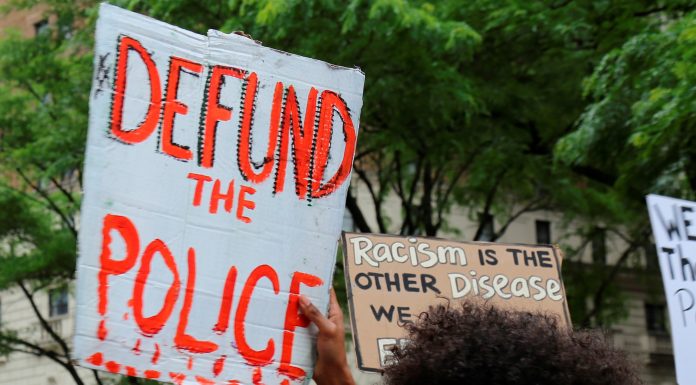(Liberty Headlines) Far-left city councilors in Minneapolis, Minnesota, voted unanimously Friday in support of the highly contentious and controversial defunding of police.
That leaves the bigger of the Twin Cities—where George Floyd was killed on Memorial Day while in police custody—with no discernible plan for how it intends to maintain order, although the council’s ordinance may still face hurdles before implementation.
But with a greater burden likely placed on state law-enforcement, Minnesota’s GOP-led state senate pledged that it would not bow to the demands of Democrats trying to hijack the debate in the wake of nationwide race riots.
Key Republican lawmakers in the smaller Twin City—the state capital of St. Paul—said Friday that they’ll block most of the ambitious changes Democrats want to make and that they plan to approve only a limited set of police accountability measures.
Senate Majority Leader Paul Gazelka and the chairman of the Senate judiciary committee, Warren Limmer, laid out their agenda shortly before the Legislature convened for a special session. They said there’s only a short amount of time to act because they intend to adjourn June 19 no matter what. That would effectively force the state House to adjourn too, but Gazelka said lawmakers would continue to work on bigger changes.
“Minnesota has the opportunity to lead the way for the whole nation for reconciliation of the races and some of the problems we’re addressing,” Gazelka said. ”Let’s begin here.”
Minnesota is one of several states where Democratic lawmakers and governors are hoping to harness the anger over Floyd’s death to remake law enforcement, including by adding new restrictions on the use of force.
Democratic Gov. Tim Walz and the House Democratic majority are backing a slate of proposals from the People of Color and Indigenous Caucus. They’ve been rolled into three bills on the themes of “Reclaiming Community Oversight,” “Reforming Accountability” and “Reimagining Public Safety.” The first House committee hearing on those bills is set for Saturday.
But Gazelka told reporters that Senate Republicans’ top priority was voting to end the emergency powers that Walz has used to respond to the COVID-19 pandemic. Republicans contend that Walz has used those powers to govern unchecked, causing unnecessary harm to the state’s economy without achieving better results than states with looser restrictions, such as neighboring Wisconsin.
The vote was 38-29, with three Democrats siding with Republicans. But the House blocked the GOP attempt, rejecting a similar resolution 73-61.
Limmer said the five policing bills the Senate will pass before next Friday will include some of the less disputed Democratic proposals, including a ban on police chokeholds and neck restraints. Most Minnesota police departments already have rules limiting chokeholds, and Minneapolis recently strengthened its ban under a court-approved agreement with the state. He also said they may include a rewrite of rules governing the police use of force.
Limmer specifically rejected a Democratic proposal to put the state attorney general, former US Rep. Keith Ellison, in charge of prosecuting officer-involved killings.
Ellison has taken over the Floyd case, but as a nationally known figure from the liberal wing of his party, he’s a lightning rod for Republicans. The Democratic National Committee’s former deputy chair, he left Congress in disgrace after accusations of domestic abuse.
Much like his protege and replacement, Rep. Ilhan Omar, Ellison also has taken a hard-line stance in support of anti-Semitic groups like the Nation of Islam.
Democratic House Majority Leader Ryan Winkler complained that the Senate Republican plan falls short of what the moment requires.
“It’s entirely accurate to say that this is a lazy and last-minute approach to a problem that has been with us for a long time, and that we have been working on for a long time,” Winkler said.
The special session was already in the works before protests erupted in Minneapolis and spread around the world over Floyd’s death in police custody. Walz called it so he could extend his emergency authority another 30 days.
Given that Walz must call a special session each time he extends his emergency powers, House Speaker Melissa Hortman said her chamber would block the GOP attempt. Hortman said lawmakers will likely be back in another month “for a forced check-in” that would provide another opportunity to address policing issues.



